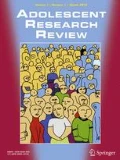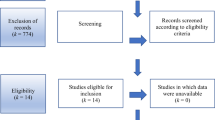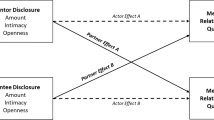Abstract
There are critical gaps in the youth mentoring knowledge base arising from methodological limitations, including an over-reliance on self-report measures, as well as an overall lack of precision. Direct observational methods allow for more precise comparison across mentoring dyads because, in contrast to respondents applying their own idiographic meanings and interpretations, consistent procedures for obtaining data are possible. However, direct observational methods are highly underutilized in the youth mentoring research field. The authors summarize seminal work to date on youth mentoring relationship processes, including the few studies that have employed direct observation methods. The authors describe two broad approaches to conducting direct observation research, naturalistic and laboratory-based observation, and offer a framework to guide theoretical and practical decisions regarding the use of each approach, as well as limitations of each. It is ultimately argued that by surfacing the relational mechanisms at work in high quality mentoring relationships, direct observational methods provide an avenue for advancing successful practice in this field. The article concludes with a discussion of implications for future research and practice.
Similar content being viewed by others
References
Aspland, H., & Gardner, R. (2003). Observational measures of parent-child interaction: An introductory review. Child and Adolescent Mental Health, 8(3), 136–143.
Burkhardt, R. W. (2005). Patterns of behaviour: Konrad Lorenz, Niko Tinbergen, and the founding of ethology. Chicago: University of Chicago Press.
Cavell, T. A., & Elledge, L. C. (2013). Mentoring and prevention science. In DuBois, D.L, & Karcher, M. (Ed.), Handbook of youth mentoring (pp. 29–43, 82–99). Thousand Oaks, CA: Sage Publications.
Coan, J. A., & Gottman, J. M. (2007). The specific affect (SPAFF) coding system. In J. A. Coan & J. J. B. Allen (Eds.), Handbook of emotion elicitation and assessment (pp. 106–123). New York: Oxford University Press.
Deane, K. L., & Dutton, H. (2019). The youth-adult partnerships observational study: Research rationale, protocol and procedures. Auckland: University of Auckland. Unpublished manual.
Deutsch, N. L., & Spencer, R. (2009). Capturing the magic: Assessing the quality of youth mentoring relationships. New Directions for Youth Development, 121, 47–70.
Dishion, T. J., & Granic, I. (2004). Naturalistic observation of relationship processes. In S. N. Haynes & E. M. Heiby (Eds.), Comprehensive handbook of psychological assessment: Volume 3, behavioral assessment. Hoboken, NJ: Wiley.
DuBois, D. L., Holloway, B. E., Valentine, J. C., & Cooper, H. (2002). Effectiveness of mentoring programs for youth: A meta-analytic review. American Journal of Community Psychology, 30(2), 157–197.
DuBois, D. L., Portillo, N., Rhodes, J. E., Silverthorn, N., & Valentine, J. C. (2011). How effective are mentoring programs for youth? A systematic assessment of the evidence. Psychological Science in the Public Interest, 12(2), 57–91.
Dutton, H. (2018). Mentor self-disclosure in youth mentoring relationships: A review of the literature about adults disclosing to non-familial adolescents in intervention settings. Adolescent Research Review, 3(1), 57–66. https://doi.org/10.1007/s40894-017-0065-0.
Dutton, H., Bullen, P., & Deane, K. L. (2019). “It is OK to let them know you are human too”: Mentor self-disclosure in formal youth mentoring relationships. Journal of Community Psychology, 47(4), 943–963. https://doi.org/10.1002/jcop.22165.
Dutton, H., Deane, K. L., & Bullen, P. (2018). Distal and experiential perspectives of relationship quality from mentors, mentees, and program staff in a school-based youth mentoring program. Children and Youth Services Review, 85, 53–62. https://doi.org/10.1016/j.childyouth.2017.12.008.
Farver, J. M. (1999). Activity setting analysis: A model for examining the role of culture in development. In A. Goncu (Ed.), Children’s engagement in the world: Sociocultural perspectives (pp. 99–127). Cambridge, MA: Cambridge University Press.
Fletcher, G. J., Simpson, J. A., Campbell, L., & Overall, N. C. (2013). The science of intimate relationships (Vol. 323). Malden, MA: Wiley-Blackwell.
Gardner, F. (2000). Methodological issues in the direct observation of parent-child interaction: Do observational findings reflect the natural behavior of participants? Clinical Child and Family Psychology Review, 3(3), 185–198.
Girme, Y. U., Overall, N. C., & Simpson, J. A. (2013). When visibility matters: Short-term versus long-term costs and benefits of visible and invisible support. Personality and Social Psychology Bulletin, 39(11), 1441–1454. https://doi.org/10.1177/0146167213497802.
Gottman, J. M. (1998). Psychology and the study of marital processes. Annual Review of Psychology, 49, 169–197.
Grossman, J. B., & Rhodes, J. E. (2002). The test of time: Predictors and effects of duration in youth mentoring relationships. American Journal of Community Psychology, 30(2), 199–219.
Hallam, R., Fouts, H., Bargreen, K., & Caudle, L. (2009). Quality from a toddler’s perspective: A bottom-up examination of classroom experiences. Early Childhood Research & Practice, 11(2), n2.
Hammond, M. D., & Overall, N. C. (2015). Benevolent sexism and support of romantic partner’s goals: Undermining women’s competence while fulfilling men’s intimacy needs. Personality and Social Psychology Bulletin, 41(9), 1180–1194. https://doi.org/10.1177/0146167215593492.
Herbers, J. E., Garcia, E. B., & Obradovic, J. (2017). Parenting assessed by observation versus parent-report: Moderation by parent distress and family socioeconomic status. Journal of Child and Family Studies, 26, 3339–3350. https://doi.org/10.1007/s10826-017-0848-8.
Heyman, R. E. (2001). Observation of couple conflicts: Clinical assessment applications, stubborn truths, and shaky foundations. Psychological Assessment, 13(1), 5–35.
Karcher, M. J., & Hansen, K. (2014). Mentoring activities and interactions. In D. L. DuBois & M. Karcher (Eds.), Handbook of youth mentoring (2nd ed., pp. 63–82). Thousand Oaks, CA: Sage Publications.
Karcher, M. J., & Nakkula, M. J. (2010). Youth mentoring with a balanced focus, shared purpose, and collaborative interactions. New directions for youth development, 126, 13–32.
Keller, T. E. (2005). The stages and development of mentoring relationships. In D. L. DuBois & M. Karcher (Eds.), Handbook of youth mentoring (pp. 82–99). Thousand Oaks, CA: Sage Publications.
Keller, T. E., & Pryce, J. M. (2010). Mutual but unequal: Mentoring as a hybrid of familiar relationship types. New Directions for Youth Development, 126, 33–50.
Keller, T. E., & Pryce, J. M. (2012). Different roles and different results: How activity orientations correspond to relationship quality and student outcomes in school-based mentoring. The Journal of Primary Prevention, 33(1), 47–64.
Keller, T. E., Pryce, J. M., & Neugebauer, A. (2004). Observational methods for assessing the nature and course of mentor-child interactions. Chicago, IL: University of Chicago. Unpublished manual.
Larose, & Tarabulsy, (2014). Academically at-risk students. In D. L. DuBois & M. Karcher (Eds.), Handbook of youth mentoring (2nd ed., pp. 30–43). Thousand Oaks, CA: Sage Publications.
Liang, B., Bogat, A., & Duffy, N. (2013). Gender in mentoring relationships. In D. L. Dubois & M. Karcher (Eds.), Handbook of youth mentoring (2nd ed., pp. 159–175). Thousand Oaks, CA: Sage Publications.
Lofland, J., & Lofland, L. H. (1995). Analyzing social settings: A guide to qualitative observation and analysis (3rd ed.). Belmont, CA: Wadsworth.
Margolin, G., Oliver, P. H., Gordis, E. B., O’Hearn, H. G., Medina, A. M., Ghosh, C. M., et al. (1998). The nuts and bolts of behavioral observation of marital and family interaction. Clinical Child and Family Psychology Review, 1(4), 195–213.
McLeod, J. (2014). Doing research in counselling and psychotherapy. Thousand Oaks, CA: Sage Publications Inc.
Nock, M. K., & Kurtz, S. M. S. (2005). Direct behavioral observation in school settings: Bringing science to practice. Cognitive and Behavioral Practice, 12, 359–370.
Overall, N. C., Fletcher, G. J. O., Simpson, J. A., & Sibley, C. G. (2009). Regulating partners in intimate relationships: The costs and benefits of different communication strategies. Journal of Personality and Social Psychology, 96(3), 620–639. https://doi.org/10.1037/a0012961.
Ozer, E. J., & Douglas, L. (2015). Assessing the key processes of youth-led participatory research: Psychometric analysis and application of an observational rating scale. Youth & Society, 47(1), 29–50.
Pellegrini, A. D. (1996). Observing children in their natural worlds: A primer in quantitative observational methods. Mahwah, NJ: Lawrence Erlbaum Associates.
Pryce, J. (2012). Mentor attunement: An approach to successful school-based mentoring relationships. Child and Adolescent Social Work Journal, 29(4), 285–305.
Pryce, J. M., Gilkerson, L., & Barry, J. E. (2018). The mentoring FAN: A promising approach to enhancing attunement within the mentoring system. Journal of Social Service Research, 44(3), 350–364.
Pryce, J., & Keller, T. E. (2012). An investigation of volunteer-student relationship trajectories within school-based youth mentoring programs. Journal of Community Psychology, 40(2), 228–248.
Pryce, J. M., & Keller, T. E. (2013). Interpersonal tone within school-based youth mentoring relationships. Youth & Society, 45(1), 98–116.
Raposa, E. B., Rhodes, J., Stams, G. J. J., Card, N., Burton, S., Schwartz, S., …, Hussain, S. (2019). The effects of youth mentoring programs: A meta-analysis of outcome studies. Journal of Youth and Adolescence, 48(3), 423–443.
Rhodes, J. E. (2005). A model of youth mentoring. In D. L. DuBois & M. Karcher (Eds.), Handbook of youth mentoring (pp. 30–43). Thousand Oaks, CA: Sage Publications.
Spencer, R. (2007). “It’s not what I expected” A qualitative study of youth mentoring relationship failures. Journal of Adolescent Research, 22(4), 331–354.
Spencer, R. (2012). A working model of mentors’ contributions to youth mentoring relationship quality: Insights from research on psychotherapy. LEARNing Landscapes, 5(2), 295–312.
Spencer, R., Gowdy, G., Drew, A., McCormack, M., & Keller, T. E. (2019). It takes a village to break up a match: A systemic analysis of formal youth mentoring relationship endings. Child & Youth Care Forum. https://doi.org/10.1007/s10566-019-09520-w.
Spencer, R., & Liang, B. (2009). “She gives me a break from the world”: Formal youth mentoring relationships between adolescent girls and adult women. The Journal of Primary Prevention, 30(2), 109–130.
Sperling, J., & Repetti, R. L. (2018). Understanding emotion socialization through naturalistic observations of parent-child interactions. Family Relations, 67(3), 325–338.
Strauss, A., & Corbin, J. M. (1997). Grounded theory in practice. Los Angeles, CA: Sage Publications.
Waters, E., & Deane, K. E. (1985). Defining and assessing individual differences in attachment relationships: Q-methodology and the organization of behavior in infancy and early childhood. In I. Bretherton & E. Waters (Eds.), Growing points of attachment theory and research (pp. 41–65). Monographs of the Society for Research in Child Development, Vol. 50, Nos. 1–2 (Serial No. 209).
Xia, J. (2011). An anthropological emic-etic perspective on open access practices. Journal of Documentation, 67(1), 75–94.
Zaslow, M. J., Weinfield, N. S., Gallagher, M., Hair, E. C., Ogawa, J. R., Egeland, B., et al. (2006). Longitudinal prediction of child outcomes from differing measures of parenting in a low-income sample. Developmental Psychology, 42(1), 27–37. https://doi.org/10.1037/0012-1649.42.1.27.
Acknowledgements
The authors would like to acknowledge participants in the studies profiled here, as well as partner agencies.
Author information
Authors and Affiliations
Contributions
JP conceived of the review, participated in its design and coordination, and drafted the manuscript. KD conceived of the review, participated in its design, and helped draft the manuscript. JB helped draft the manuscript and assisted with editing throughout. TK participated in the design of the review and helped draft and edit the manuscript. All authors read and approved the final manuscript.
Corresponding author
Ethics declarations
Conflict of interest
The authors report no conflict of interests.
Ethical approval
All authors complied with ethical standards as regulated by their host institution. The studies profiled in depth in this review were all reviewed by the Institutional Review Board of relevant institutions.
Additional information
Publisher's Note
Springer Nature remains neutral with regard to jurisdictional claims in published maps and institutional affiliations.
Rights and permissions
About this article
Cite this article
Pryce, J., Deane, K.L., Barry, J.E. et al. Understanding Youth Mentoring Relationships: Advancing the Field with Direct Observational Methods. Adolescent Res Rev 6, 45–56 (2021). https://doi.org/10.1007/s40894-019-00131-z
Received:
Accepted:
Published:
Issue Date:
DOI: https://doi.org/10.1007/s40894-019-00131-z




